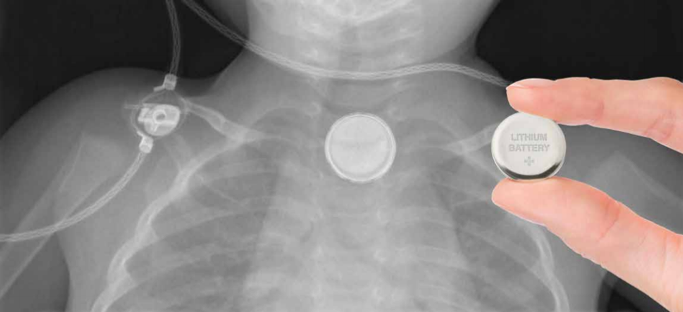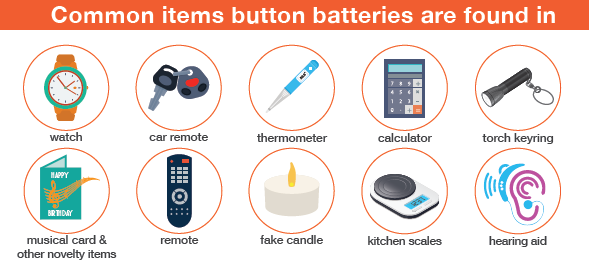
Every week, approximately 20 children present to hospital emergency departments across the country due to button battery related injuries.
Kidsafe Victoria is urging parents and carers to perform regular button battery audits of areas in and around their homes, to reduce the risk of children accessing and ingesting button batteries.
Tragically, two Australian children have died due to button battery related injuries; four year old Summer Steer in 2013 and 14 month old Isabella Rees in 2015, who both ingested button batteries from unidentified sources.
It is estimated that 20 children per week present to hospital emergency departments across the country due to button battery related injuries – over 1,000 children every year – highlighting the alarming extent of the issue.
Children who survive can be left with permanent injuries, require countless painful surgeries and face a lengthy recovery process.
Jason Chambers, General Manager of Kidsafe Victoria, emphasised the danger of these powerful small coin-sized batteries which are found in many homes.
“If swallowed, a button battery can become stuck in a child’s throat where saliva immediately triggers an electrical current. This causes a chemical reaction that can burn through the oesophagus in as little as two hours, causing severe life-threatening injuries and in some cases death”, he said.
The symptoms of a button battery ingestion can be similar to those of many other common childhood illnesses – this, coupled with the fact that many children are too young or unable to say what they have ingested, means that they can remain undetected for long periods of time.
“Children under five years of age are at greatest risk. With so many common products using button batteries, one of the major dangers is that a child can swallow a battery without anyone hearing, seeing or knowing”, said Mr Chambers.
Button batteries are found in many common household items including remote controls, calculators, bathroom or kitchen scales, car keys, toys, watches, talking books, musical cards, flashing novelty items, hearing aids and flameless candles.
“Many products come with button batteries already installed. People may be surprised at just how many items in and around their homes contain them and could be posing a hazard to their own children or visitors to their homes”, said Mr Chambers.

Allison Rees heartbreakingly lost her 14 month old daughter, Isabella, to a button battery ingestion in February of 2015. She has taken the pain of her loss and turned it into action by establishing ‘Bella’s Footprints’, a foundation with the aim of raising awareness of the dangers posed by button batteries.

Allison has urged the public to help keep children safe by sharing information with their family, friends and wider communities.
“Keep sharing your knowledge of button battery dangers and tell as many people as you can, because the more awareness and the more education, the more lives we can save”.
“It’s too late for Bella, but it’s not too late for everyone else. It is our hope that no other family ever has to endure the pain and suffering of losing a precious child in such a horrific way”, said Allison.
Kidsafe Victoria’s Button Battery Safety Tips
- ● Check home environments and identify items that may contain button batteries.
- ● Examine all devices and check that the battery compartment of items containing button batteries is secured.
- ● Store loose button batteries and items that contain them out of reach of children.
- ● Always dispose of batteries immediately and safely – an uncharged button battery can still cause serious and life-threatening injuries if ingested.
- ● Check novelty items and toys for button batteries before giving these to children.
- ● The symptoms caused from ingesting a button battery can look like other childhood illnesses.
- ● If you suspect a child has ingested a button battery, don’t wait for them to show symptoms. Immediately call the Poisons Information Centre on 13 11 26 for advice (24 hours, 7 days a week). In an emergency situation, call 000 for an ambulance.
For more information on button batteries, please visit the Kidsafe Victoria website.

